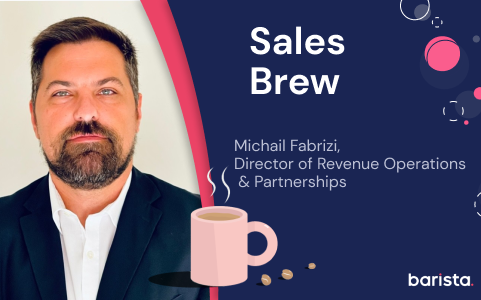CRM data automation: Sales Brew with Michail Fabrizi on how to automate CRM data

Roy Weinstock
For the 12th episode of Sales Brew by barista AI, we had the opportunity of hosting Michail Fabrizi, a Revenue Operations veteran at Sorcero to talk about CRM data automation. It’s a must for every Ops that cares about data.
To watch the full interview and get updated on every sales brew episode, subscribe to our YouTube channel. A short version and transcription are below. Get a cup of coffee and enjoy the show!
How did you get into Revenue Operations?
Getting into Revenue Operations is often not a linear path, and my journey is no exception. I began my career in sales in the enterprise SaaS industry, primarily focusing on the European market. During my time as an Account Executive, I noticed a significant challenge in the lack of objective data communication from sales management.
To address this issue, I took the initiative to co-manage the CRM system. I started diving into the data, analyzing how both my personal pipeline and the team’s pipeline were developing. My goal was to identify insights that could help us improve our sales motion. This initial involvement with CRM management and data analysis sparked my interest in Revenue Operations.
From there, I gradually took on more tasks and responsibilities related to the CRM and expanded my focus to encompass the entire sales process. I delved into understanding the buyer’s journey and recognizing the interconnectedness of different functions within the sales process. This led to my promotion to Sales Operations Manager, where I continued to deepen my knowledge and skills in Revenue Operations.
Now, as the Director of Revenue Operations at my current company, I am grateful for the journey I have taken. Although it may not have followed a linear path, having experienced the front line of the go-to-market team has given me a valuable perspective. I understand the difference that Revenue Operations can make in improving the lives of those interacting with prospects and customers, ultimately leading to better revenue outcomes.
In summary, my transition into Revenue Operations stemmed from my proactive involvement in CRM data management and data analysis while working as an Account Executive. This gradually led to my recognition of the broader impact and importance of Revenue Operations, culminating in my current role as a Director.
How important was your sales background to your RevOps career?
My sales background has played a significant role in my career in Revenue Operations. While it’s important to note that Revenue Operations doesn’t necessarily require a specific go-to-market (GTM) background, my sales experience provided valuable insights and perspectives.
Having worked in sales, I gained firsthand knowledge of the challenges and pain points faced by sales teams. This understanding allowed me to recognize the potential for leveraging data to make sales motions more efficient and effective. For example, by analyzing data, I could identify patterns or drop-off rates in the sales process after demos, indicating areas that needed improvement.
In my role in Revenue Operations, I’ve also collaborated closely with other functions such as marketing and customer success. This broader exposure has enabled me to develop a more holistic understanding of the entire revenue generation process.
While Revenue Operations is not limited to a specific function, my sales background has given me insights into the real pain experienced by sales teams and the potential for Revenue Operations to address those pain points. When Revenue Operations is implemented effectively, it can provide solutions that alleviate challenges for sales, marketing, and customer success teams.
In summary, my sales background has provided me with valuable insights into the pain points experienced by sales teams. This understanding has allowed me to approach Revenue Operations with a focus on addressing those pain points and making the overall revenue generation process more efficient and effective.
What are the most urgent CRM challenges you’re always facing?
The most urgent CRM challenges I constantly face are specific to the startup company I work for in the life sciences industry. However, there are also universal challenges that many of us encounter.
One of the key challenges is CRM data automation to minimize manual input. It is crucial to ensure that data is clean and automated to avoid CRM data leakage and inconsistencies. While there are some solutions available on the market, manual processes still play a significant role in dealing with this challenge. The goal is to prevent people who interact with the CRM, directly or indirectly through integrated tools, from compromising the data and to capture their interactions as accurately as possible.
Another important challenge is enablement, which is a core element of revenue operations. This involves providing comprehensive training on CRM tools and ensuring consistency throughout an individual’s lifecycle within the company. Processes are put in place to prevent data duplication and minimize manual input, as these can lead to significant issues.
In summary, the primary CRM challenges I face revolve around automating functions, maintaining CRM data quality, and enabling effective CRM usage throughout the organization. While there are some solutions available, these challenges often require ongoing manual efforts to address them effectively, like Salesforce duplicates for example. I tend to use quite a lot CRM validation rules to deal with that.
Can you elaborate on CRM data automation best practices?
When it comes to CRM data automation best practices, there are several key considerations to keep in mind.
Firstly, it’s important to have a clear understanding of your organization’s tech stack and how the various tools are integrated. Mapping out the integration points ensures that data flows smoothly between different systems. For example, if your organization uses HubSpot as the CRM, integrating it with other tools like lead enrichment or sales engagement platforms is crucial. This integration ensures that the data in the CRM is accurate and up to date.
Furthermore, when setting up dashboards or reporting mechanisms, it’s essential to ensure tight integration with the fields you want to capture. This allows you to track and analyze the right data points for insights and process improvements.
While automation plays a significant role in CRM data automation management, manual efforts are still necessary to verify and orchestrate the revenue data. Regular audits are essential to ensure that data is being properly captured and that nothing is missing. Discovering missing or inaccurate data after the fact can have a negative impact on reporting, especially when presenting to the executive team.
In some cases, third-party tools or overlays can be used to synchronize and visualize data from different sources, providing insights and analytics. However, it’s important to maintain an ongoing review process to ensure the accuracy and effectiveness of these integrations.
Another key part is to track sales activity data and automatically populate to your CRM as many data as you can.
Overall, CRM data automation best practices involve a combination of proper integration, regular audits, and manual review to ensure accurate and reliable data for reporting and decision-making.
How do you incentivise reps to update their CRM?
Incentivizing sales reps to update their CRM can be challenging, especially without financial incentives. However, there are several strategies that can be employed to encourage and reinforce the behavior of keeping the CRM up to date.
One approach is through enablement and training. Ensuring that reps understand the importance of updating contact data and other relevant information is crucial. They need to grasp why it is necessary and how it contributes to the overall success of the organization. By providing comprehensive training on CRM usage and the impact of accurate data, reps are more likely to recognize its value and be motivated to keep it updated.
Another effective strategy is clearly map out the buyer’s journey and define the specific data points that need to be captured at each stage. By establishing clear expectations and minimum requirements for data input, reps understand what information is essential for analysis and decision-making. This helps rationalize the importance of their contributions and provides a framework for consistent data entry.
Regular audits and verification processes are also essential. By conducting periodic checks and reviews, both individually and with sales management, reps can see firsthand how their updates impact reporting and pipeline health. This helps them understand the direct correlation between accurate data and their own success. It’s important to provide feedback and highlight the consequences of incomplete or outdated information, emphasizing the impact it can have on their own financial outcomes.
Ultimately, incentivizing reps to update the CRM may require a combination of conditioning, clear expectations, ongoing training, and regular feedback. It’s important to foster a collaborative environment where reps understand the value of accurate data and feel motivated to contribute to its maintenance. By aligning their efforts with organizational goals and providing support throughout the process, reps are more likely to see the benefits and actively participate in CRM updates.
What are the main trends you see in Revenue Operations?
In the field of Revenue Operations, there are several key trends that are shaping its trajectory:
1. CRM data Automation and AI: As more tools and technologies emerge, Revenue Operations is becoming more automated. This automation, especially CRM data automation enables the streamlining of manual tasks, allowing Revenue Operations teams to focus on more strategic and analytical aspects of their role. The infusion of AI into dashboards and reporting tools further enhances the ability to identify trends, anomalies, and opportunities for improvement.
2. Shift towards GTM Intelligence: Revenue Operations is evolving into the intelligence hub of the Go-to-Market (GTM) team. With a wealth of data and insights at their disposal, Revenue Operations professionals are well-positioned to provide strategic guidance and actionable recommendations to the executive team. They become the go-to resource for understanding what is happening on the ground and identifying areas for growth and optimization.
3. Proactive problem-solving: As Revenue Operations teams leverage advanced analytics and automation, they are becoming more proactive in identifying and addressing issues. They are no longer solely reactive to problems but are actively monitoring key metrics, identifying potential roadblocks, and providing early warnings to leadership. This proactive approach allows for quicker course corrections and optimization of revenue-generating activities.
4. Expanded scope and collaboration: Revenue Operations is extending its reach beyond traditional departments such as marketing, sales, and customer success. It is increasingly collaborating with other functions like product and solutions engineering. By analyzing data and providing insights on the customer journey and value proposition, Revenue Operations contributes to cross-functional alignment and helps identify areas for improvement across the entire organization.
5. Strategic consultancy role: Revenue Operations is emerging as an in-house strategic consultant for executives. With their deep understanding of the business, data-driven insights, and cross-functional perspective, Revenue Operations professionals are well-suited to advise and guide executive decision-making. They provide valuable input on revenue generation strategies, market trends, and operational efficiencies.
Overall, the main trends in Revenue Operations involve the adoption of automation and AI, the transition to a more strategic and proactive role, expanded collaboration with different departments, and the elevation of Revenue Operations as a trusted source of intelligence and consultancy for executive leadership. CRM data automation is a key part of it.
How do you like your coffee?
When it comes to coffee preferences, I enjoy my coffee as an espresso. Being Italian, espresso is a familiar and cherished choice for me. However, I don’t consider myself a coffee snob and can appreciate different espresso options. While I’m not particularly fond of Starbucks espresso, I find Kimbo espresso to be quite good. So, that’s how I like to have my coffee every day.
To watch more from Sales Brew about CRM data automation and more:
- Episode 1: Sales Brew with Tyler Meckes, Account manager at Dooly
- Episode 2: Morgan J Ingram, Director of Sales Execution and Evolution at JB Sales
- Episode 3: James Buckley, Chief Evangelist and Master of Ceremonies at JB Sales
- Episode 4: Nieka Mamczak, Head of Sales Enablement at StackOverflow
- Episode 5: Sam Sweeny, Sales Operations Manager
- Episode 6: Benjamin Roach, Global Sales Operations Manager at Ardoq
- Episode 7: Elgun Aliyev, Salesforce Admin at CentralReach
- Episode 8: Amanda Harwood, Sales Operations Manager
- Episode 9: Jake Rasmussen, Salesforce Consultant
- Episode 10: Taylor Thomson, Director of Revenue Operations at Within
- Episode 11: Aparna, Sr. Director of Revenue Operations at Dscout
- Episode 12: Michail Fabrizi, Sales Operations Manager at Sorcero


